- Home
- Samantha Shannon
The Mime Order Page 11
The Mime Order Read online
Page 11
“Five thousand.”
Heads turned. It was the Monk, mollisher of I-2. As always, his face was shadowed by a black hood.
“Five thousand! A clear winner,” Didion proclaimed. Presumably that would keep him in powdered wigs and ill-fitting trousers for a while longer. “The candle is extinguished, and the spirit of Sergeant Edward Badham belongs to the Abbess of I-2. Commiserations to everyone else!”
Groans and curses filled the crypt, along with bitter mutterings of those from poorer sections. I pursed my lips. Waste of time. Still, at least I’d been able to leave the den for a few hours.
The enormous Highwayman stood, knocking his chair to the floor. Silence fell at once.
“Enough of this charade, Waite.” His voice boomed. “That spirit is the property of II-6. Where did you get it?”
“This spirit came into my keeping legally, sir, like all my spirits do.” Didion bristled. “If you really believe that all the spirits of II-6 want to stay there, why do I keep finding them in my territory, sir?”
“Because you’re a macer and a crook.”
“Can you prove these allegations, sir?”
“One day,” was the dark reply, “I will find the Ripper, and you will prove it with your life.”
“I hope that is not a threat against my person, sir, verily I do.” The auctioneer was all of a quiver. “I shall not endure that sort of talk in my wife’s very own auction house, sir. Judith would never have allowed such wanton verbal abuse, sir.”
“Where’s your wife’s spirit?” a medium shouted. “Shall we auction her off, too?”
Didion purpled like a bruise. You knew things were getting serious when Didion Waite ran out of sirs.
“Enough.” One of the mime-queens stood. Her short, bright auburn hair was slicked in a pompadour style, and she spoke with a light Bulgarian accent. “The candle is to blame, Highwayman, not the one who lit it. Look to your own streets for your bloody Ripper.”
With a snarl of anger, he stormed from the crypt. Spring-heel’d Jack ran off as well, laughing to himself in that insane way of his, and Jenny Greenteeth growled as she left. As I picked up my jacket and satchel, Didion rushed towards the Monk, but he was already halfway up the steps.
“I’ll take it,” a young woman said. Her red hair was worn in a braided bun, with a fan-shaped comb to hold it in place.
Didion handed her a binding bond. “Of course, of course.” He kissed her hand, which bore a long gold ring. “Tell the Abbess to send her binder when she pleases.”
The girl gave him a gracious smile and pocketed the bond. “I’ll see to it that you have your money within a few days, Mr. Waite.”
The Abbess was certainly flush with cash these days. Most of the central gang leaders were wealthy, but I wasn’t convinced that many of them had five grand to throw at a spirit.
“Pale Dreamer?”
A mime-queen had stopped in the aisle in front of me, the one with auburn hair. I touched three fingers to my forehead, as was expected around members of the Unnatural Assembly. “Ognena Maria.”
“You look different. I was about to say I hadn’t laid lamps on you in a while, but your face has been all over London.”
“Broke out of the Tower.” I pulled the strap of my bag on to my shoulder. “I didn’t know you were a Ripper hunter.”
“I’m not. I just desperately need more spirits, and the Juditheon seemed like the best place to get them.”
“You could have chosen one that wasn’t from H Division.”
“I know, but I like a challenge. Not that I’m rich enough to win.” She held out an arm. “Heading up?”
There was nothing more to do down here. I knew I should be hightailing it outside—Jaxon was waiting on the street—but what she’d said was curious. “You must have plenty of spirits,” I said as we walked up the steps. The brooches on her jacket clinked. “Why this one?”
“We had quite a few of them leave I-5 recently. They seem to be repelled by one street in particular. I can’t see anything wrong with it, unless someone’s botched a séance in one of the houses.” A line creased her forehead. “It worries me more than I’ll admit to my voyants. I don’t suppose you’ve had the same in I-4?”
“Binder would have said.”
“Oh, Binder’s so far off the cot he’s in the grave. I really don’t know how you work for him.” She worried at her nail ring. “I don’t suppose he’d be interested in renting a pitch in Old Spitalfields?”
“I can ask him.”
“Thank you, sweet. He’s better off than I’ll ever be.” Maria pushed open the trapdoor.
“Should I tell him about your problem?”
“He won’t care, but you can try.”
The panel took us up into the shell of what had once been a church. Shafts of pale sunlight sliced in through the broken roof of Bow Bells, one of the few churches in London that hadn’t been gutted and repurposed as Vigile stations. It had been disfigured in the early twentieth century, of course, like all things associated with the afterlife and the monarchy—the wings struck off the cherubim, the altars destroyed by republican vandals—but its bells still hung in the tower. The whole place reminded me of Sheol I. A vestige of an older world.
I pushed the cover of the crypt back into place. Another woman was standing near the altar, talking to the Monk and the courier. She was tall and slim, dressed in a tailored suit, and a top hat was pinned over thick furls of chestnut hair.
The Abbess herself had turned up to meet her mollisher. Mime-queen of I-2, founder of the largest night parlor in London.
“Maria!” She clapped her hands. Her voice put me in mind of a match being struck. “It is you, isn’t it, Maria?”
“Congratulations, Abbess,” Maria said stiffly. “What a dazzling prize.”
“You’re very kind. I don’t have as fine a collection of spirits as some, but I do occasionally like to bid. Tell me, how are you coping with the red zone?”
“Well enough. You know the Pale Dreamer, don’t you?”
The Abbess studied me through a birdcage veil. I could just make out her light brown skin, long nose, and a red feather of a smile. “Of course I do. The White Binder’s prodigy. What joy.” She took my chin in her lace-clad hand. “Oh, but you’d make a lovely nightwalker.”
“She’s a little busy being Weaver’s quarry.” Maria sniffed. “I’d love to stay and chat, but I’ve a market to manage.”
“I want a word.” The Abbess released me. “Either we talk now, Maria, or we talk tonight.”
“I only leave my voyants once each red day.”
“Tomorrow, then. I’ll send one of my couriers to arrange it.”
With a terse nod, Maria walked on. I followed.
“Bloody madam.” She flung open the doors. “Glad someone’s got time for chin music.”
“What do you think she wants?”
“Probably more nightwalkers. I told her, none of my voyants are interested. Doesn’t stop her asking.” Maria turned up the collar of her coat against the wind. “You keep safe, sweet. There’s always a place for you in I-5, you know, if you ever fancied moonlighting.”
“I’ll keep it in mind.”
She walked briskly in the direction of Bank station. I’d been approached with offers of work before, as had Eliza—poachers often trekked between the sections, trying to bribe skilled voyants into moonlighting for a different boss—but I’d turned them down every time. Jaxon paid enough, and it was risky to work a second job. Most mime-lords would consider it a betrayal worthy of banishment, if not a death sentence.
But Maria had looked genuinely concerned about the loss of spirits, about the possible threat to her voyants’ welfare. She might make a useful ally, if only I could get the word out. And if I didn’t scrape some money together, moonlighting might be my only choice.
A buck cab was waiting for me on the corner. “Binder said you’re to go to the Garden,” the driver said.
“Really?”
“Really. Hurry up, will you?” She wiped at her neck with a handkerchief. “Risky enough taking a fugitive in my cab without her dragging her feet.”
I climbed in. Eliza must have finished a painting.
SciLo was still in the red, with security higher than Old Paul’s spire. Underguards at station barriers round the clock, military vehicles patrolling the central cohort during the day, Vigiles armed with double the weapons. As the cab passed a transmission screen, my face flashed up for the thousandth time. To a stranger, this face would look hostile: unsmiling, too proud for pity, with chill gray eyes and the pallor of a corpse. It was not the face of an innocent. She was unnaturalness incarnate, this woman on the screen. Her eyes held death and ice. Just as Warden had said.
Warden. While I was in the citadel, hiding from my own reflection, my Rephaite collaborator was a fugitive as well. I pictured him in the Netherworld, harvesting amaranth, using its essence to soothe his scars. Looking over his shoulder for the Sargas. I didn’t know what the Netherworld looked like, but I imagined it as a dark, glorious realm, teeming with half-living things. And Warden with his black-handled blade, tracking the blood-sovereign as she fled her kingdom, like Edward VII before her. Warden in the heat of the hunt. The image shook me to the core, saturating my blood with adrenaline.
“If I never return,” he’d said, “it will mean that everything is all right. That I have ended her.” Well, he hadn’t returned, and it was clear that nothing was all right. Something was happening behind the masquerade of Scion, and if Nashira had killed my only real Reph ally, I might never find out what it was.
He had risked—and lost—everything to help me escape my prison. In return, I’d gone crawling back to my petty treasons with my tail between my legs, failed to convince Jaxon to fight, and cursed Hector’s name where he couldn’t hear me.
When I got out of the cab, I slammed the door a little too hard. Zeke was waiting for me under the stone archways. He’d scrubbed up nicely, as he always did on selling days: silk brocade waistcoat, neatly parted hair, thick-rimmed glasses that looked fifty years old.
“How are you, Paige?”
“Chipper. Nice glasses.” I checked my cravat. “What’s the story?”
“Eliza’s finished three paintings. Jax wants them all sold by the end of the night. Plus all the junk.” He fell into step beside me. “We could use your help with selling. I’m terrible.”
“You’d be better if you didn’t think you were terrible. You said he wants us to sell everything? Does he need a new antique cane, or something?”
“He did say we were low on money.”
“I’ll believe that when he stops buying cigars and absinthe.”
“He hardly stopped drinking while you were away. Absinthe every night, Nadine said.”
Behind the eccentric lenses, his eyes were bloodshot. He looked as if he’d been at the absinthe himself.
“Zeke,” I said, “did Jaxon really look for me?”
“Oh, yeah. He didn’t stop searching until July. Then he seemed to give up, and he took Nadine as a temporary mollisher. When Nick got word about you in August, after we saw you in Trafalgar Square, he was . . . well, a little mad with joy. That was when he started the search again.” He adjusted his glasses. “Has he said he’ll do anything about the Rephaim?”
“Nope,” I said.
“Are you going to do something?”
“He’s told me not to,” I said, trying not to sound bitter. “He requires our complete commitment to I-4.”
He shook his head. “That’s insane. We have to do something.”
“If you have any suggestions, I’m all ears.”
“I don’t,” he admitted. “I don’t know where we’d start. I was talking about it with Nick the other day, and I thought we could do some kind of national broadcast, but we’d have to get into the Archon to do that. And even if we could, how do you tell people what you know they won’t believe?”
I hadn’t realized Zeke was that ambitious. Much as I liked the idea, ScionEye’s security was far too tight for us to even consider broadcasting a transmission from the inside. “We can’t run before we can walk, Zeke,” I said gently. “If we’re going to do something, we have to work from the bottom. Let the syndicate know, then the rest of the citadel.”
“Yeah, I know. It was wishful thinking.” Zeke cleared his throat. “By the way, did Nick tell you—?”
“Tell me what?”
“Nothing. Forget it. Did you get the spirit?” he asked quickly.
“The Abbess snagged it. But what were you going to—?”
“It doesn’t matter. I don’t think Jax really cares about H Division. He almost admitted he was doing it to spite Didion.”
“What else is new?” Didion and Jaxon had been at war for years, jabbing at each other with pamphlets and, occasionally, physical violence. Didion despised Jaxon for being “the most discourteous sir I ever did meet”; Jaxon hated Didion for being a “useless, curly-haired fribble”, and for having terrible teeth. It was hard to argue with either assessment.
We walked together along the colonnade until we reached a lantern. Instead of the muted blue of the average Scion streetlamp, its panes were made of a deeper, cobalt glass, tinged with green, hard to see unless your eye was attuned to it. It hung above the door to a second-hand clothes shop. Zeke gave a subtle signal to the shopkeeper, a voyant, who nodded.
A winding staircase took us into the basement of the shop. There were no customers down here; just racks of second-hand clothes and three mirrors. Zeke looked over his shoulder, then pulled one of them open like a door. We sidled through the gap and into the long tunnel.
The black market was situated between Covent Garden and Long Acre. An underground cavern of about fifteen thousand square feet, it had been the hub of illegal trading for decades. Most hawkers earned their flatches on the fringes of the amaurotic markets, but this one was entirely voyant, and entirely secret. The NVD had never surrendered its location to Scion, probably because so many of them still bought their numa from its stalls. Their employers gave them food and shelter, but no means to touch the æther. It was a wretched life they led, fighting their own natures.
The cavern was poorly ventilated, thick with the heat of hundreds of bodies. Stalls sold thousands of numa, every kind imaginable. Mirrors: hand-held, full-length, framed. Crystal balls too heavy to lift. Smoked-glass shew stones, small enough to fit inside a palm. Séance tables. Burning incense. Teacups and cast-iron kettles. Keys for locks that might never exist. Small blunted blades. Boxes of needles. Blacklisted books. Tarot decks of all designs. Then there were the augurs’ stands, where flowers and herbs were sold in abundance. Past that were bottles of medicine for mediums—muscle relaxants, adrenaline, lithium—and fine instruments for whisperers, and pens for psychographers, and smelling salts to block out the foul odors that sniffers would pick up on.
Zeke stopped by a booth selling masks and put one on. A cheap one caught my eye, plastic with a coat of silver paint, just big enough to cover the top half of my face. I dug into my pocket and paid with a little of the money Jaxon had given me for the auction.
The flagship booth of I-4 specialized in funerary art, winding sheets and other morbid luxuries for the affluent clairvoyant. No cheap numa on our stall. All our goods were laid out on crushed velvet, arranged around glass vases of roses. Behind the table, Eliza was a vision in a deep-green velvet dress. Her golden hair fell in polished ringlets down her back, and her arms were wound in delicate black lace. She was talking with an augur in a trader’s attire. When she saw us, she said something to him, and he left.
“Who was that?” I said.
“Art collector.”
“Great. Now go behind the curtain.”
“All right, all right.” She brushed a spec of dust from the largest painting. “Zeke, can you pick up some more roses?”
“Okay. You want a coffee?”
“And some water. And some adrenaline.” Eliza wipe
d her brow with her sleeve. “We’ll be here all night if we don’t get these sold.”
“You need to be out of sight.” I took her elbow and led her to the back of the stall, where a curtain concealed our coats and bags. With a sigh, she sat down and took out some work Jaxon had given her. She liked to be there so we could consult her, but if anyone saw an art medium near our paintings, they’d put two and two together at once. Zeke put his head around the curtain.
“Where’s Jax?”
“He said he had business somewhere else,” Eliza said. “As per usual. Just get the roses, will you?”
With a slight frown, Zeke went on his way. Eliza was usually in a foul mood after a possession, riddled with tics and spasms. I unloaded a few human skulls from a box. “Do you want a break?”
“I need to be here.”
“You look shattered.”
“Yes, Paige, I’ve been up since Monday.” Her eyelid gave a hard twitch. “Jax sent me here as soon as I finished with Philippe.”
“We’ll sell them. Don’t worry. Where’s Nadine?”
“Hawking.”
I couldn’t blame her for being short with me. By rights she ought to be asleep in a dark room after a trance, waiting for the tremblings to subside. I helped her with the wares, piling up skulls, hourglasses, pocket watches, specimen frames. Most of them were made by skilled soothsayers in Jaxon’s employ, then sold for five times what he paid for them.
A dispute soon broke out on the opposite stall, where a pair of palmists were offering readings. The querent was an aculto-mancer, and he seemed to be slightly unhappy with what his palm had told him.
“I want all of my money back! Charlatan!”
“Your palms are your enemies, friend, not me. If you want your own version of the truth,” the palmist said, his eyes hard as flint, “perhaps you should try knitting it.”

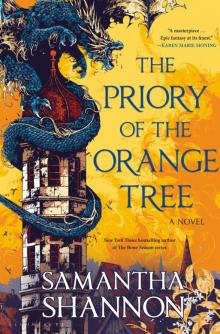 The Priory of the Orange Tree
The Priory of the Orange Tree The Dawn Chorus
The Dawn Chorus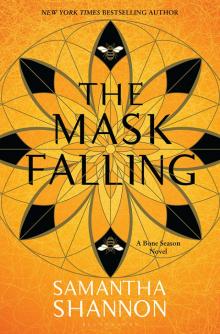 The Mask Falling
The Mask Falling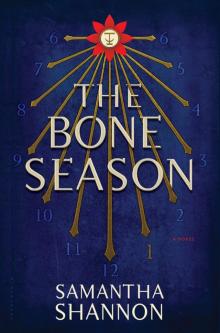 The Bone Season
The Bone Season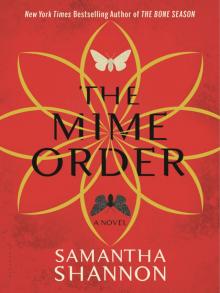 The Mime Order
The Mime Order The Song Rising
The Song Rising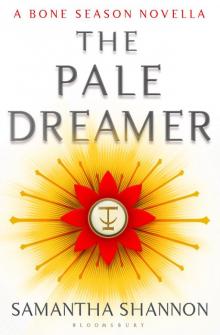 The Pale Dreamer
The Pale Dreamer